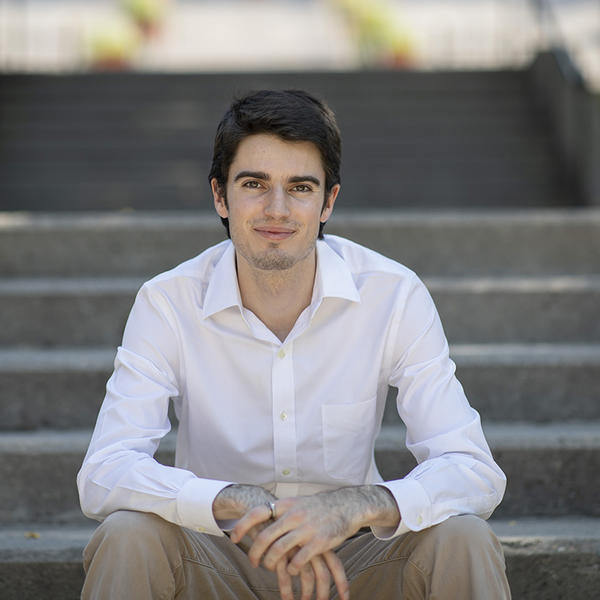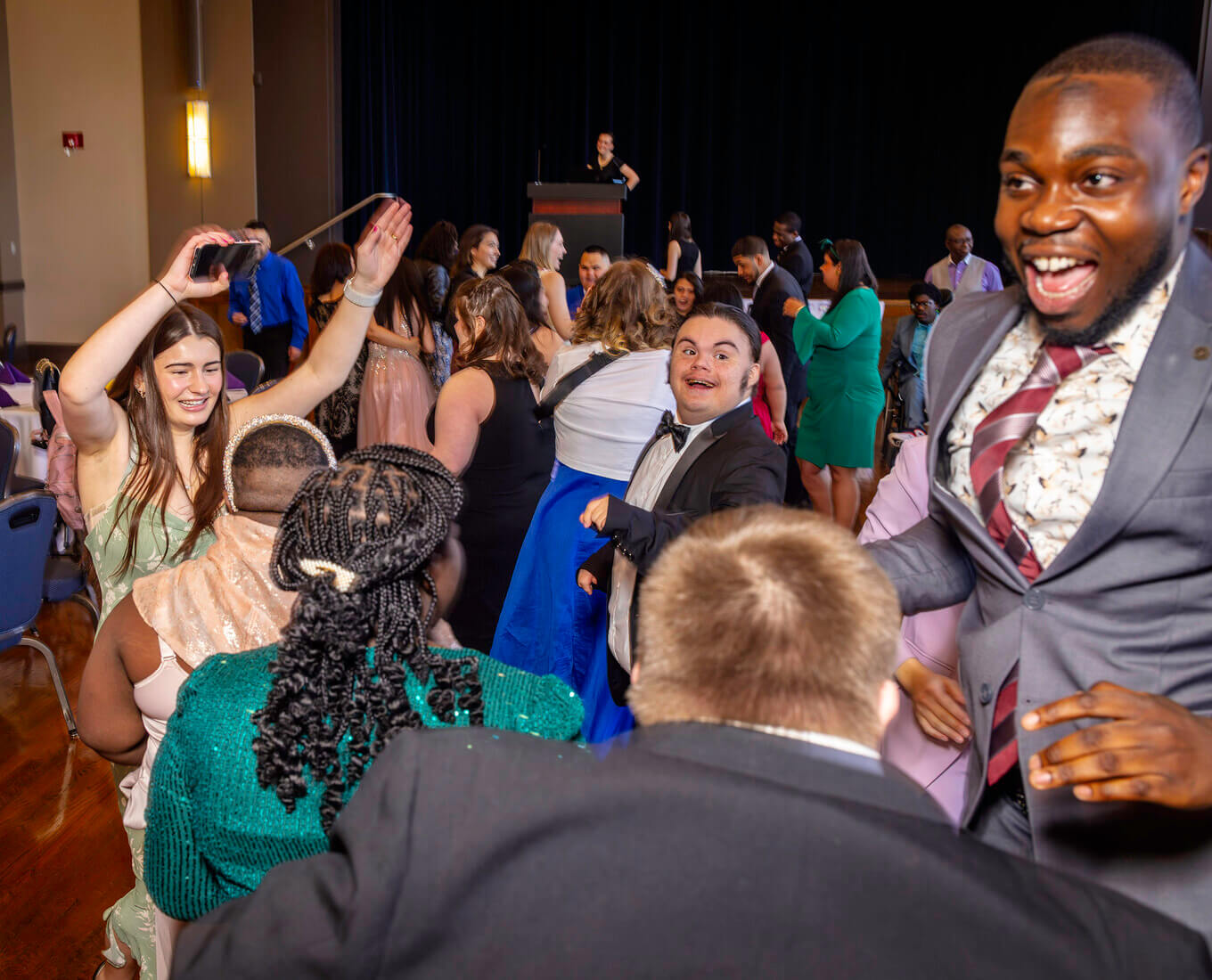The College of the Holy Cross introduced Max Hendrix '23 to a new side of economics: one that includes philosophy and psychology.
As one of two Fenwick Scholars at the College this academic year, Hendrix will spend his senior year challenging the idea behind rational choice theory, which argues that humans are rational beings who make decisions in line with their preferences and interests. That line of thinking, though, fosters the belief that humans are intrinsically selfish.
In receiving the College's highest academic honor, a Fenwick Scholar spends their senior year working closely with advisors on a scholarly project instead of taking a traditional year of classes, and presents their project to the Holy Cross community in the spring. The 2022-2023 academic year marks the Fenwick Scholar program's 55th year at the College.
Philosophy professor Karsten Stueber and economics and accounting professor Kolleen Rask are advising Hendrix. Also providing Hendrix help this year are Mark Hallahan, chair of the psychology department, and Daniel Schwab, assistant professor of accounting and economics.
How would you describe rational choice theory?
There's an ongoing discussion in the fields of philosophy and psychology of conceiving of human nature as somewhere between complete selfishness and fundamentally altruistic who and social. It's definitely a spectrum. I would say that rational choice theory falls somewhere closer to human beings being selfish but the theory focuses on how we use rationality to make a decisions we believe is in our own best interest. The important caveat for this theory though, is that it doesn’t mean that people can’t have preferences for helping other people or doing philanthropy, and those action can still be considered "selfish."
What intrigued you about rational choice theory?
One of the big things was my freshman year, you start with very, very broad models that are functional, but didn't necessarily seem to reflect how I viewed the world interacting. At first, I knocked it off, like maybe I'm just naïve. The further I got into [rational choice theory], I realized that maybe there is a flip side to that. That there is a social aspect that is really important in decision-making when it comes to, not only economics but rational calculations to anything.
How did your background in philosophy lay the foundation for the economic side of this project?
This started in ethics class with Professor Karsten Stueber. We were talking, and I found some links between philosophy and economics. Adam Smith is known as the grandfather of economics, but he also has a huge wealth of ethics writings that place a large focus on empathy.
Then, there's also philosopher Thomas Hobbes; those individuals are used in both fields. That was the springboard to seeing how these initially seemingly different fields are actually pretty interconnected in a lot of ways.
You want to test the limits of Rational Choice Theory, how would you test that?
Empirics are definitely important, but when we talk about things that can't necessarily be tested in the same way as a physical science, like social interactions, it's through analysis, rather than the pure numbers of economics and what creates a market. Trying to synthesize all of that is how I'm going to actually find those limitations and strengths and holistically evaluate rational choice theory as opposed to leaving it exclusively in the empirical realm.
How do you tangibly calculate one's preferences or even social pressure regarding rational choice theory?
It's a lot about isolating specific factors through surveys or playing games. For example, in behavioral economics there is what's called an ultimatum game and a dictator game. Essentially, two participants are given money. In a dictator game, they get to choose how much they give to the other person and that's it.
In the ultimatum game, they get to propose how much money. If the other person accepts, they both get to keep it. If the other person declines, no one gets any money.
It's the same game essentially. In the dictator game, there is no possibility of repercussion from the other person if they do something seemingly unfair. So you would assume they would either give them no money or if they had to give them money, they would give them one cent, right? The interesting thing is, when talking about what the rational choice is in the dictator game, since there was no repercussions, they assumed people would give only one cent. But that wasn't necessarily what happened. They often gave closer to half.
How did Holy Cross influence your interest in this topic?
I don't think there are many other colleges that provide this type of opportunity to basically do what is graduate work. This is my main priority for the year; it’s unbelievable and truly unique. Being given the opportunity was the biggest influence for becoming more interested.
What are you looking forward to most about this research?
I'm looking forward to working with my advisors; it's one of the biggest things. I enjoy writing and reading on my own, but the biggest growth that I have always had at Holy Cross is being able to bounce ideas off others and talk. The opportunity to talk with professors who are very, very well recognized in their fields is just an unbelievable opportunity.
It's been cool to work so closely with people who do this professionally and they've all been so open and welcoming and helpful. It's just been incredible.
What's been the reaction of your advisors to the idea of making this a Fenwick Scholar project?
They've been really supportive. My other opportunity was to do it as an honors thesis. I said early on, I wasn't sure how this would work as an honors thesis. I don't get the same type of free reign. My advisors immediately thought this was multidisciplinary and it should be a Fenwick study.
They were all so excited when I actually got it. I don't think Professor Stueber ever thought I wasn't going to get it, though. He was always talking like, 'So when you get the project.' He was always one step ahead. It's been really, really cool to have that support with professors, even those who I hadn't ever worked with before.
What do you want others to take from this?
Something that really, really excites me is that [rational choice theory] is an important topic not only in academics, but in the way we view our world around us and the way we view others around us.
That was some of my pitch, for a Jesuit school that is about men and women for and with others. As a philosophy major, I always think that discussions about human nature, which some people find abstract, have really important practical implications. I think this is in that same realm. It’s research focused on academia, but I think there is an important component here in the way we view each other in society that really does have implications on not only the political policy we make, but also the way we choose to interact with others. When you assume that someone else is just out for themselves, you treat them completely differently rather than being open and thinking they would be willing to help.
Fenwick Scholar Questions Economics Theory Built on Humans Acting Selfishly

Max Hendrix ’23 introduces philosophy and psychology into a field built on data.
Read Time
6 Minutes


